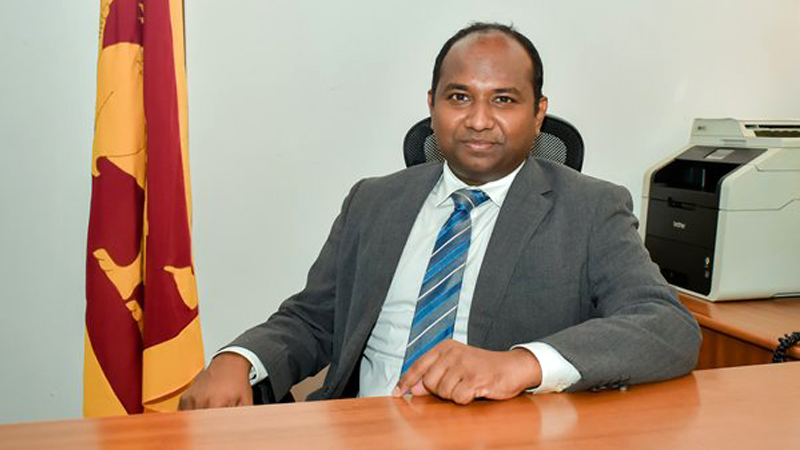 The 26th Chairman of the National Lotteries Board, Dr. Chameera Yapa Abeywardana is now entering the political fray as a candidate in the upcoming General Election.
The 26th Chairman of the National Lotteries Board, Dr. Chameera Yapa Abeywardana is now entering the political fray as a candidate in the upcoming General Election.
Representing the New Democratic Front from the Matara district under the symbol of the gas cylinder, Dr. Yapa steps into this role when public trust in politics and family-driven political legacies are under the microscope. Here, Dr. Yapa discusses his motivation to enter politics, his vision for the future and his constituency’s critical issues.
Excerpts of the interview:
Q: How has your experience as former Chairman of the National Lotteries Board shaped your approach to governance and public service?
A: I come from a political family, so I’ve been exposed to public life from grassroots level and from various administrative roles. I’ve held different positions before, and while administration always offers something to learn, leading an institution such as the National Lotteries Board (NLB) is a different challenge. The NLB is a critical institution for the economy, especially in these difficult times.
There’s a dual responsibility: on the one hand, to the State and on the other to ensure the welfare of the staff. Public servants, too, faced a difficult time amid the economic challenges and I had to manage a delicate balancing act to keep them motivated. I’m proud to say that during my tenure, the NLB outperformed in terms of revenue generation and institutional development. I also made sure that a significant portion of the staff were happy.
We also focused on the unique lottery-seller network, which consists of around 22,000 people across the country. Keeping them engaged and satisfied during these tough economic times was crucial.
Reflecting on my time there, I believe the experience was invaluable. I also think it’s essential for anyone aspiring to political office to gain corporate or semi-corporate experience, as professionalism is becoming increasingly necessary in politics. The empathy I’ve developed from my political background, combined with the professional skills from my time at the NLB has shaped my approach to governance.
Q: What motivated you to enter politics and what do you hope to achieve as a Member of Parliament?
A: My decision to enter politics stems largely from my family background. My father, who has held high political office for many years, decided it was time to retire and I naturally took it in my stride that I should take the next step. There was also a strong call from our grassroots supporters for me to step in.
I’ve always been interested in public life and this was a natural progression for me. I hope to serve the public as effectively as my father did and build on the work he has done. My goal is to contribute to positive change, drawing on the experience and values instilled in me through my upbringing and my professional journey.
Q: Why did you choose politics despite having medical and legal degrees?
A: I have an LLB and a Doctor of Medicine degree. While I practiced as a medical doctor for some time, I haven’t practiced Law as I have yet to sit for the Attorney- –at-Law examination which was delayed due to my involvement in political campaigns and the pandemic. I plan to pursue this in the near future.
I’ve always been drawn to public office and growing up in a political family, I’ve witnessed the positive impact we can have on society. My education in Medicine and Law brings a unique perspective to my work in politics. For instance, in policymaking, legal knowledge is crucial and in the broader context of public health and welfare, my medical background permits me to understand and address the needs of the people with empathy.
I believe this combination of professional expertise and my commitment to public service will help me make a meaningful contribution especially in today’s challenging political landscape.
Q: At a time when the public is rejecting family politics, is it appropriate for you to contest from Matara while your father is on the National List?
A: I understand the sentiment around family politics and it’s a topic that garners a lot of attention. However, family involvement in politics isn’t new or unique to Sri Lanka. You see it in countries such the United States, India and many other countries where political families have served their nations — some successfully, others less so.
But what’s more important is merit. The focus should be on whether an individual can deliver results for the people and serve the country professionally. If someone has proved their capability and can contribute to society, their family background shouldn’t be a disqualification. I do not think there should be a blanket policy that if you come from a political family, you are not accepted. People can judge whether the individual is delivering better as a person, whether he or she is just riding on family lineage.
Voters have the power to decide. Rather than rejecting someone purely on family lineage, I think we should evaluate candidates on their merits, skills and commitment. At the end of the day, people will vote for those they believe can bring positive change, regardless of family background.
Q: What do you see as the most pressing issues facing your constituency, and how do you plan to address them?
A: While many elected leaders from Matara have contributed positively in the past, there still are significant challenges. One of the most urgent issues is youth unemployment which is a nationwide problem but is particularly pressing here. After the economic downturn, the challenge isn’t only creating jobs but also ensuring that youth are employable.
Our education system needs a complete overhaul to produce a globally competitive workforce. We’ve been providing free education for years but it hasn’t translated into employability. It’s not only about obtaining a degree; we need to ensure that graduates have the skills needed in today’s job market.
I believe education reform is the key, starting from preschool through to university. We need to create pathways that equip students with skills for the modern economy, making them competitive locally and globally. There are reforms underway but we need to push harder for a system that aligns with the needs of a global workforce.
Q: How do you plan to engage and empower the youth in your district?
A: My primary focus is on education reforms, particularly aimed at creating an employable and skilled workforce. We need to shift our attention towards sectors such as technology, which can play a transformative role in rural and urban development. The current streams of education don’t always lead to clear career paths, so we need to integrate technology into fields such as agriculture and social enterprise to create more job opportunities.
Technology inclusion is almost non-existent in the rural sector and that’s something I want to change. By fostering industries — be it small-scale or cottage industries — and integrating them into the national value chain, we can create a sustainable development model that benefits the entire district. In the long-term, we can even look towards export. But first, we need to build a strong foundation in education and skills development which will empower the youth not only in Matara but across the country.
Q: What specific economic initiatives do you propose to enhance job creation and economic growth in your area?
A: As an immediate step, I believe we should focus on using technology and creating an ecosystem for social enterprise. Matara has a vibrant tourism market and there are several local value chains feeding into this sector. From simple products such as handmade soap to artisanal crafts, there are opportunities to integrate domestic products into a broader dollar-generating strategy.
One of my key proposals is to develop and promote social enterprise that emphasise sustainability. Globally, there’s a huge focus on sustainable businesses, and Sri Lanka has the potential to tap into this trend. With the availability of funding and global agencies willing to support such ventures, I think we can create a sustainable economic model by combining social enterprises with technological advancements.
Another initiative I plan to push forward is creating university clusters, particularly at the University of Ruhuna that can function as hubs for research and development in social enterprises. These centres would provide the technical expertise and training to empower social entrepreneurs and help them succeed. This will not only create jobs but also foster innovation in rural areas, giving local communities the tools they need to thrive in a global economy.
Q: What is the NPP Government doing right and also wrong at present?
A: In my view, the NPP Government is doing a reasonably good job, especially considering the high expectations the public has in them. Their strong stance against corruption is commendable and they are conscious about maintaining transparency and accountability for their actions. I also think it’s important that they’re continuing with the IMF program as this shows their commitment to stabilising the economy in a globally challenging environment.
While many economies are struggling, the NPP is aware of these global trends and is engaging positively with the international community which is a crucial aspect of governance today.
However, they need to be careful about balancing their populist rhetoric with the realities of governance. Campaigning and governing are two different scenarios and while it’s understandable that promises are made during elections, the real challenge is managing these expectations after coming to power. So far, I think they’ve managed the transition well, but they should remain mindful of maintaining realism in their approach to policy and public expectations.
Overall, I see a level of professionalism in their actions that bodes well for the country’s future and I hope they continue on this path.









